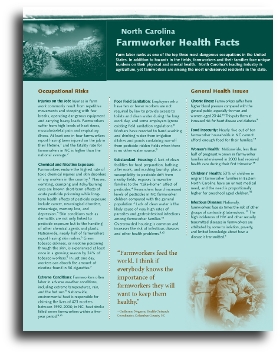The Affordable Care Act's Prognosis for Farmworkers
 Monday, July 23, 2012 at 2:49PM by
Monday, July 23, 2012 at 2:49PM by  Daryn Lane
Daryn Lane Cross-posted with the North Carolina Council of Churches
Every day, about 243 agricultural workers suffer injuries that cost them work time; about five percent of these injuries result in permanent impairment. Agriculture consistently ranks among the three most hazardous industries in the United States. In 2008, the National Safety Council ranked it as the most dangerous industry, and the U.S. Department of Labor reports that children performing farm work are four times more likely to be killed than those employed in all other industries combined.

Nationally, migrant health clinics serve only about 13% of the intended population, according to the Center for Disease Control and Prevention. Of the more than 150,000 farmworkers in North Carolina, less than 20% receive health care. At the same time, the fatality rate for farmworkers statewide is higher than the national average, and nearly 10 times higher than the average state fatality rate for all other occupations.
It is appalling that many of those who harvest our food and contribute to our well-being often work at such personal risk without basic health care. One step in the right direction was the recent announcement of $128.6 million in awards through the Affordable Care Act (ACA) which will add about 5,640 doctor, nurse, dental provider and support staff jobs nationally to clinics serving farmworkers and others. The money will go to 219 health centers nationwide, increasing access to more than one million additional patients.
The Supreme Court ruling that upheld the mandate contained within the ACA helped to ensure the continuation of these programs that allocate money to public health care centers. While this decision will benefit many, including some farmworkers, many more will be left behind. According to a detailed analysis by Farmworker Justice, undocumented farmworkers, who make up a majority of the U.S. farmworker population, will only marginally benefit from health reform and will continue to encounter enormous barriers to health care.
Eighty-five percent of farmworkers in the U.S. have no health insurance, and 9 out of 10 children in farmworker families are uninsured. The majority of these workers do not qualify for social services because of their immigration status, even though many live significantly below the federal poverty line.
Because farmworkers are often impoverished, uninsured, live in isolated areas and move frequently to follow work, many face financial and logistical barriers to receiving health care, says the Texas-based National Center for Farmworker Health. In addition, few health delivery sites have adequate Spanish language resources, including those in North Carolina, where 94% of farmworkers are Spanish-speaking.
Meanwhile, unresolved health problems can limit farmworkers’ ability to maintain productive employment, further perpetuating their position in a vicious cycle. Farmworkers are not protected by sick leave and risk losing their jobs if they miss work. Industry exemptions from rules that protect workers in other sectors and poor enforcement of existing rules leave farmworkers vulnerable and without legal recourse.
Harsh working and living conditions put farmworkers at a high risk for injuries and illness, including work-related lung diseases, noise-induced hearing loss, skin diseases, chemical-related illnesses (such as neurological disorders, miscarriages and birth defects), and certain cancers associated with chemical use and prolonged sun exposure.
Many workers also don’t seek preventative care from physicians for fear of being reported to ICE and consequently being deported. Those who are undocumented often avoid going to locations or institutions where they are made to present identification or where a record of the visit can be documented, which prevents many individuals from seeking proper medical care. Bruce Gould, MD for the University of Connecticut’s mobile Migrant Farm Worker clinic says that sometimes during his visits to camps he finds farmworkers hiding in bushes — they are often desperate for medical care but fear they will be fired if their foreman finds out they are sick.
The American Farm Bureau estimates that without the help of undocumented workers, the agricultural sector of the economy would lose between $5 and $9 billion in flowers, fruits, and vegetables and would cause more than 20% of the production to move overseas. Agriculture is North Carolina’s leading industry, constituting 22% of the state’s income. Eighty-five percent of fruits and vegetables produced in the United States, including those in North Carolina, are harvested by hand.
The help provided by migrant farmworkers is critical for the agriculture sector of the U.S. economy. As Guillermo Noguera, Health Outreach Coordinator in Columbus County, NC said, “Farmworkers feed the world. I think if everybody knows the importance of farmworkers, they will want to keep them healthy.”
All people deserve care. Providing health care to all is not an issue concerning only the patient that is ill; rather, it encompasses a public health dimension, which involves the health of all members of the community. As Margarita, a mother and farmworker in Oxford, NC noted “It’s very important, not just for one person but for the whole community.”
Looking beyond individual health and the economics of the law, will the Supreme Court’s decision reinforce America’s commitment to civil rights and equal opportunity for all – including farmworkers? Or will it reinforce the role of health coverage as a divider between those who will prosper and those who will not?
–Daryn Lane, Student Action With Farmworkers Into The Fields Intern










Reader Comments